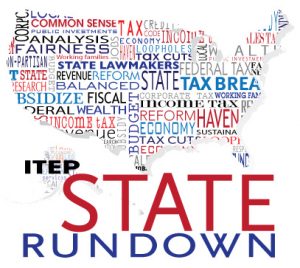 State tax debates have been very active this week. Efforts to eliminate the income tax continue in West Virginia. Policymakers in many states are responding to revenue shortfalls in very different ways: some in Iowa, Mississippi, and Nebraska seek to dig the hole even deeper with tax cuts, while the Missouri House’s response has been to slash funding for a property tax program that helps low-income seniors remain in their homes. Other responses include Oregon lawmakers considering sensible reforms to broaden the income tax base and Delaware‘s governor who wants to engage the public and “reset” the budget and tax conversation altogether. In other news, Florida and Oklahoma legislators are reconsidering tax breaks and credits given out in previous years, and several states continue to look at their gas taxes for transportation funding needs as well as reforming other consumption taxes.
State tax debates have been very active this week. Efforts to eliminate the income tax continue in West Virginia. Policymakers in many states are responding to revenue shortfalls in very different ways: some in Iowa, Mississippi, and Nebraska seek to dig the hole even deeper with tax cuts, while the Missouri House’s response has been to slash funding for a property tax program that helps low-income seniors remain in their homes. Other responses include Oregon lawmakers considering sensible reforms to broaden the income tax base and Delaware‘s governor who wants to engage the public and “reset” the budget and tax conversation altogether. In other news, Florida and Oklahoma legislators are reconsidering tax breaks and credits given out in previous years, and several states continue to look at their gas taxes for transportation funding needs as well as reforming other consumption taxes.
— Meg Wiehe, ITEP State Policy Director, @megwiehe
Major Tax Overhauls Being Debated
- In West Virginia new changes to SB 335 will be moving on to the state’s full Senate Finance Committee for consideration. The bill would still eliminate the state’s income taxes, but over a longer period. Personal income taxes would be decreased to a flat rate of 2.5 percent before phasing out, inching toward elimination if certain triggers are met, between 2023 and 2032. Post personal income tax elimination, if triggers are met, the corporate net income tax would then phase out, followed by a reduction in severance taxes. The elimination/reduction of these taxes would be replaced by an 8 percent general consumption tax and soda and alcohol tax increases.
- Meanwhile, the West Virginia House of Delegates is considering a 5.1 percent flat tax rate for the state’s personal income tax coupled with a 5.5 percent sales tax rate and base broadening.
- Georgia lawmakers are considering a slew of tax changes, including a harmful regressive proposal to flatten the state’s income tax, though that bill includes positive aspects and could be improved with a simple fix.
Varied Responses to Revenue Shortfalls
- Some Nebraska legislators continue to seek tax cuts despite a large and growing revenue shortfall and political disagreement over tax and funding priorities.
- Even after sweeping several special funds into the General Fund, Mississippi lawmakers are still faced with a budget gap, and the state is likely to “collect less revenue than it did the previous year for only the second time in modern history,” a largely self-imposed problem due in part to repeated tax cuts. Some are arguing this needs to be the wake-up call to convince the legislature to cancel the harmful tax cuts passed last year that are to be phased in over the next ten years.
- Soon-to-be Iowa Gov. Kim Reynolds indicated recently that she is on the tax-cut train and plans to cut income taxes under the long-debunked belief that doing so will grow the state’s economy. Meanwhile the revenue forecast has been reduced again, growing the state’s revenue shortfall by $131 million for the current fiscal year and $191 million for the upcoming budget.
- Rather than consider revenue solutions to Missouri‘s fiscal woes, the House has opted to eliminate funding for a property tax circuit breaker program that helps low-income seniors and people with disabilities stay in their homes as their property taxes rise and their incomes remain fixed. A major contributor to the revenue shortfall appears to be unintended consequences of corporate tax measures passed in 2013 and 2015.
- Facing a $1.6 billion budget deficit, some lawmakers have suggested limiting Oregon‘s mortgage interest deduction, which currently costs the state $500 million a year and disproportionately benefits taxpayers in the highest income tax bracket. The bill would cap the deduction at $15,000 and eliminate it altogether for homeowners making over $200,000 (MFJ).
- Delaware Gov. John Carney is holding “budget reset” conversations around the state, asking for input on how to best fill the state’s $350 million budget gap and promoting a balanced approach that includes funding cuts for services as well as additional revenues.
- North Dakota’s revenue shortfall grew again as the official forecast was reduced due to a “double whammy” of low oil prices and farm commodity prices.
Reconsidering Tax Breaks
- The Oklahoma Senate, struggling with the negative effects of recent tax cuts, approved legislation that would repeal the tax cut’s trigger and stop the state’s top 5 percent income tax rate from dropping to 4.85 percent next year.
- The Florida House passed a bill last week with a veto-proof 87-28 vote to eliminate Enterprise Florida, an agency used primarily by Gov. Rick Scott to hand out tax subsidies to businesses.
Transportation Funding Needs
- South Carolina‘s glaring need for a gas tax update to fund repairs to its ailing roads and bridges has been fairly uncontroversial so far, as one version passed the House last week and a slightly larger version has now advanced from a Senate committee, but Gov. McMaster has thrown a potential wrench in the plan by hinting he may veto the bill. Local jurisdictions that share in those costs will be watching closely, especially considering a proposed fix to the state’s underfunded pension system would push costs onto cities, towns, schools, and other local jurisdictions in what one mayor is calling a local “bailout” to cover for state mistakes.
- In other transportation funding news, West Virginia‘s Senate Transportation Committee has advanced a bill to increase some fees and taxes, including a 4.5-cent gas tax increase, to fund the state’s roadways, and both California and Colorado have introduced bills that would respectively increase the gas and sales taxes in order to fund infrastructure.
- Lawmakers from Connecticut, Massachusetts, Rhode Island, Vermont, and New Hampshire are all considering proposals to reduce carbon emissions, possibly moving toward a regional initiative.
Consumption Taxes and More
- Some Connecticut legislators are looking to marijuana as a revenue raiser, using Colorado’s experience as a blueprint.
- The South Dakota Supreme Court has struck down a law requiring online retailers to collect sales taxes, an expected result that puts the question one step closer to being reconsidered in the U.S. Supreme Court.
- Arizona‘s Governor Doug Ducey has signaled his support for extending a 0.6 percent sales tax hike that is set to expire in 2021. In FY 2016, the tax brought in $644 million.
- Struggling to retain qualified teachers, two California senators have introduced a bill that would completely exempt teacher income from the personal income tax.
- A New Jersey lawmaker has introduced a bill to give a $100 tax credit to people who donate blood at least four times per year.
- Nevada lawmakers are now debating adding a property tax floor to some types of properties to help make up for the revenue issues their two property tax caps have caused, adding further complexity and highlighting why these arbitrary caps are not considered good policy solutions.
- The Florida House has advanced a bill to the Senate that would restrict local jurisdictions’ ability to set their own tax rates.
Governors’ State of the State Addresses
- Most governors have now given their addresses for the year. The next scheduled address is Gov. Kasich of Ohio on April 4.
What We’re Reading…
- The Rockefeller Institute’s latest report on state and local tax revenues shows revenue growth coming in “much lower than historical averages” and foresees “continued weakness in personal income and overall state tax revenue collections.” The struggles have been worst among oil-dependent states (more on that here and here). The report also outlines some of the many ways federal tax and budget changes are causing difficulties for states and localities (more on that here).
- A new report by Good Jobs First evaluates how well (or poorly) city and county governments disclose the tax incentives subsidizing economic development programs.
- New Jersey Policy Perspective points out that despite the rhetoric of anti-tax crusaders, the share of the state’s population composed of millionaires has continued to rise and the state now has the third-highest share in the nation.
- New Jersey Policy Perspective also released its Blueprint for Economic Justice & Shared Prosperity last week, a set of realistic, research-backed suggestions for improving the state’s tax code and budget practices.
If you like what you are seeing in the Rundown (or even if you don’t) please send any feedback or tips for future posts to Meg Wiehe at [email protected]. Click here to sign up to receive the Rundown via email.





